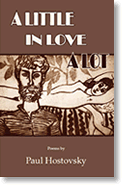
Poems from A Little in Love a Lot
Little Things
Me and Beth Jeannette had a little thing.
This was a long time ago when my
thing was little and I didn’t know anything
about such things. Somehow we ended up
upstairs in her bedroom on her bed
with her face very close to mine and a little
pimply. Her eyes were soft, her hands were
busy. My hands were folded politely
in my lap, as though waiting for tea or
poetry. My eyes, roaming the walls, found
an M.C. Escher print with tessellating
staircases, and climbed them peripherally
while Beth continued to block my view
with her nose. In the end, our little thing
was like those staircases—it went nowhere
though it seemed to be going somewhere,
especially when she touched my thing and I
had to go to the bathroom. All these years later
I look back on that little thing with fondness,
tenderness, and a little sadness, as though
I were looking back from deep within infinity
at my first tender, tentative tessellations.
The Place of Literature
Mr. Gordon was perhaps a little tipsy
at the awards ceremony, perhaps a little
scornful of the football coach’s ode
to yardage, the basketball coach’s
paeons to the MVPs, the music teacher’s touting
her flautist, the science teacher his
scion of Einstein. So when Mr. Gordon
got up to give the literary magazine award
to me, he lurched a little drunkenly, swayed
a little imperceptibly, steeply rocking in his
moment on stage. Not to be outdone,
he said in his opinion I was probably
the greatest poet writing in English anywhere today—
and a gasp went up from the high school auditorium,
then murmurs of admiration and disbelief and
mutiny spread through the audience as I rose
to accept Mr. Gordon’s slightly exaggerated
handshake. Then he kissed me on the mouth,
and raised my hand above my head in the manner
of referees and prizefighters, grinning glaringly
over at the football coach, and nodding trochaically.
Miracles
Spiritual texts are the most boring books in the world.
None of them mentions a bicycle
or a Ferris wheel, or baseball, or sea lions, or ice cream.
They just lump them all together into “the world.”
The “world of appearances.” The “world of illusions.”
You can walk through this world and not
believe it for a minute. You can get to the end of it
and not believe that either. The miracle is seeing
right through the world to another
world that’s right here, right now.
But you have to let go of everything.
You have to let go of everything—you can
start by letting go of these words, just let them
go. Let them fall through the air, skim
your knee, spill to the floor. How to read these words
when they’re lying on the floor face-down
like bodies? That is the seeming difficulty.
You can sit in a small room all alone with your body
and not believe it for a minute. You can
don the humble johnny that closes in the back,
and when the doctor comes in with his numbers
which are your numbers, you can
not believe them either. You can let them fall from his lips,
skim your ear, pool on the floor where your eyes
and his eyes have fallen. He won’t
mention the bicycle, or the Ferris wheel which is
taking up a lot of room right now in the little
examining room where a sea lion has clambered up
onto the table and is barking, and the baseballs are flying,
and the vendors are hawking ice cream—because he can’t
see them. He can’t perform a miracle.